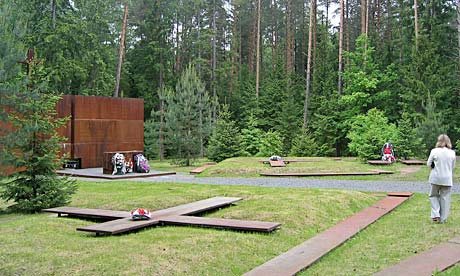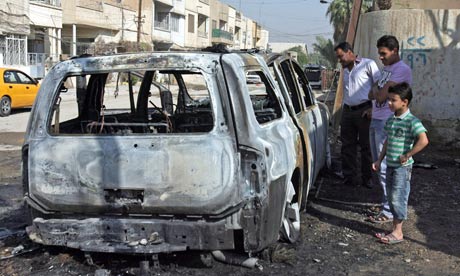 |
| A memorial dedicated to the Polish officers murdered in the Katyn forest in 1940. (Dario Thuburn/AFP/Getty Images) |
By Tom Parfitt
The Guardian, November 26, 2010
"In a symbolic admission of guilt, Russia's parliament has declared that Joseph Stalin ordered his secret police to execute 22,000 Polish army officers and civilians in 1940, in one of the greatest mass murders of the 20th century. Today's acknowledgment of Stalin's personal culpability over the Katyn massacre comes amid a cautious thaw between Moscow and Warsaw, whose recent relations have been thorny at best. It was also seen as a sign that Russia may finally be ready for muted self-scrutiny over its totalitarian past. Mikhail Gorbachev admitted in 1990 that the NKVD was to blame for the massacre, after a half-century of the Soviets blaming it on Nazi troops. However, there has never been a formal statement which implicates the Soviet leadership in such explicit terms. Officials in Warsaw greeted the declaration positively. 'It is a good step, an important sign,' Poland's speaker of parliament, Grzegorz Schetyna, told reporters. It would ensure a 'better atmosphere' for Russian president Dmitry Medvedev's visit to Warsaw next week, he added. The 21,768 officers, doctors, policemen and other public servants -- captured by the Red Army when it swept into Poland after the outbreak of the second world war in 1939 -- were mainly shot in Katyn forest near Smolensk in western Russia and in several other places. The current improvement in ties accelerated after Poland's then president, Lech Kaczynski, and 95 other people including scores of high-ranking government and military figures, died in April when their plane crashed on landing at Smolensk. The passengers were on their way from Warsaw to attend an event commemorating the 70th anniversary of the massacre. In the wake of the crash, Russia's prime minister, Vladimir Putin, made unequivocal statements about Soviet responsibility for the Katyn massacre and urged reconciliation. Historian Natalya Lebedeva, a Russian member of the two countries' intergovernmental commission on 'especially complex questions,' told the Guardian that Putin's words had helped the healing process. 'Both Russia and Poland realise it is time to stop the confrontations,' she added. [...]"






















